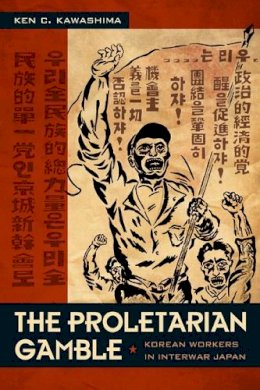Ken C. Kawashima is Associate Professor of East Asian Studies at the University of Toronto.
“The Proletarian Gamble provides students of modern Japanese-Korean history with a meticulously researched window into the lives of Korean labor migrants to Japan. Kawashima’s efforts will prove invaluable to students of Korean-Japanese affairs, but also to those interested in labor and migration issues, as well. This book should be required reading for all who enjoy the convenience of Japan’s extensive railway network, given the critical role that the Koreans described within played in laying much of its foundation.” - Mark E. Caprio, Acta Koreana “[F]irst-rate, indispensible reading on Korean workers in the Japanese empire. . .” - Jinhee Lee, Journal of Asian Studies “Ken Kawashima’s book The Proletarian Gamble is a much needed and long overdue contribution to the fields of labor history and zainichi (resident-Korean) studies in Japan. . . . Kawashima offer[s] his readers a highly nuanced, eye-opening account of the experience of Korean day labor, and the role that particular institutions played in shaping that experience.” - Samuel Perry, International Journal of Asian Studies “[T]his book struck me not only for its stimulating methodologies, but also for its careful empirical observation. This seems to me to be a relatively rare and praiseworthy combination in any academic setting.” - Jae-Won Sun, Pacific Affairs “This book is at once refreshingly old-fashioned and innovative. . . . Kawashima’s study is generally persuasive, in places brilliant. . . . [I]n foregrounding contingency and offering a careful theoretical grounding for his analysis, Kawashima has achieved a great deal.” - Andrew Gordon, Journal of Social History “Kawashima has delivered a well-researched social history that should be added to the reading list of all serious students of modern Korea and Japan.” - Christopher Gerteis, American Historical Review “This book establishes Ken C. Kawashima not simply as one of the best students of modern Japanese history in the world, but as one with a rare facility for effective use of theory amid a plethora of primary sources in Japanese and Korean. This book illustrates at once a very detailed daily life of Korean day workers in various Japanese cities, a study thoroughly at home with both modern Japanese and Korean history, and an author who is fully versed in a wide body of theory-Marx, Benjamin, Althusser, Foucault, Žižek, and many others. It is simply the best book in East Asian history that I have read in many years.”-Bruce Cumings, University of Chicago “The Proletarian Gamble provides students of modern Japanese-Korean history with a meticulously researched window into the lives of Korean labor migrants to Japan. Kawashima’s efforts will prove invaluable to students of Korean-Japanese affairs, but also to those interested in labor and migration issues, as well. This book should be required reading for all who enjoy the convenience of Japan’s extensive railway network, given the critical role that the Koreans described within played in laying much of its foundation.” - Mark E. Caprio (Acta Koreana) “[F]irst-rate, indispensible reading on Korean workers in the Japanese empire. . .” - Jinhee Lee (Journal of Asian Studies) “[T]his book struck me not only for its stimulating methodologies, but also for its careful empirical observation. This seems to me to be a relatively rare and praiseworthy combination in any academic setting.” - Jae-Won Sun (Pacific Affairs) “Kawashima has delivered a well-researched social history that should be added to the reading list of all serious students of modern Korea and Japan.” - Christopher Gerteis (American Historical Review) “Ken Kawashima’s book The Proletarian Gamble is a much needed and long overdue contribution to the fields of labor history and zainichi (resident-Korean) studies in Japan. . . . Kawashima offer[s] his readers a highly nuanced, eye-opening account of the experience of Korean day labor, and the role that particular institutions played in shaping that experience.” - Samuel Perry (International Journal of Asian Studies) “This book is at once refreshingly old-fashioned and innovative. . . . Kawashima’s study is generally persuasive, in places brilliant. . . . [I]n foregrounding contingency and offering a careful theoretical grounding for his analysis, Kawashima has achieved a great deal.” - Andrew Gordon (Journal of Social History)

